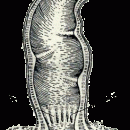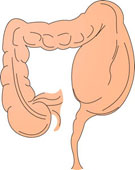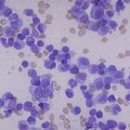It is known that in the CRC we are talking about such, right for example, almost intimate complaints, like pain and rumbling, bloating and the associated increased gas formation (meteorism). And at the same time, in addition, constipation or diarrhea ... Doctor Honey is responsible for current issues. Sciences Arkady Sheptulin.
Content
 Arkady Alexandrovich, what this is for a new disease — «irritable intestinal syndrome»?
Arkady Alexandrovich, what this is for a new disease — «irritable intestinal syndrome»?
Term «irritable intestinal syndrome» entered the use of relatively recently — about ten years ago. And before that time appeared as a diagnosis «Chronic spastic colitis».
With a detailed endoscopic study of the colon, it turned out that in fact no colitis (i.e. inflammation of the intestinal mucosa) in patients not observed. But what about complaints and pronounced symptoms? Then the doctors wondered: what could be the cause of these complaints? — and concluded: most patients have impaired nervous regulation of intestinal motor function. This condition and got a name «irritable intestinal syndrome».
But what about the theory of bacterial growth in the intestines, a disturbance of microflora? Generally, term «Dysbacteriosis»?
In our habitual understanding of dysbacteriosis, as such, it does not exist, as it does not have its own clinical picture, always in one degree or another inherent in any disease.
Under the CRC, the clinical picture is distinguished by the variety of complaints available: the combination of pain in the abdomen and intestinal disorders, and often with headaches; sleep violation; Feeling «Coma in the throat» when swallowing; Often — rapid urination; Vegetative (neurotic violations). In general, experts allocate the 3 main variants of the SRC flow:
- with a predominance of pain and meteorism;
- with a predominance of regular constipation
- or, on the contrary, diarrhea.
Of course, all listed symptoms can be «Signals» More serious diseases of the gastrointestinal tract: such as ulcerative colitis, Crohn's disease (chronic intestinal inflammation) and finally malignant neoplasms. Therefore, we, gastroenterologists, in matters of diagnostics of the CRC should always be guided by clear criteria so as not to »skip» More serious diseases. For this patient, it is necessary to carry out detailed clinical trials of blood, internal organs and others.
The syndrome itself is a direct threat to a person's life does not represent?
Yes, but how many daily troubles delivers it, how worsening the quality of life itself! Given the delicate character of complaints in the SRC, the overwhelming majority of patients are simply shy about talking about them even at the doctor's reception. Imagine the situation when the patient — respectable, confident man, and his doctor — Young pretty woman; Think here ten times — Say or wander.
Therefore, often the patient is psychologically easier instead of intimate confession from the doctor to go to the pharmacy and ask «Something from the belly». And as a result — worsening quality of life, daily problems against the background of long emotional stress at work, in transport, everywhere. While under the condition of the mutual desire of the doctor and the patient, the SRC can be successfully treated. Moreover, treatment is not limited to the reception of drugs, it is complex and includes psychotherapeutic methods.
 What methods are used in the treatment of SRK?
What methods are used in the treatment of SRK?
In addition to all sorts of drugs, treatment must include the normalization of the mode and the nature of nutrition, and ultimately — Increase internal patient discipline. When patients are found in patients with manifestations of depressive and hypochondriac syndromes — As a rule, after consulting a psychotherapist — Assigns antidepressants and anxiolitics — For example, amitriptyline. Generally, as for drugs, their choice, only a doctor can do this, and in strict dependence on the domination of one of the three cases of the disease, which we have already spoken today.
For example, the Gastroenterologists are usually prescribed, gastropolitical effects are usually prescribed, gastriszolmine: for example, butylskopolmine, oliconium bromide, as well as furniture, well-proven especially in cases of pain disorders.
During the dominance in the clinical picture of the SRK of constipation on the forefront, dietary recommendations come out, in particular — Enrichment of the diet of the so-called ballast substances — Food fibers, in parallel with which preparations are prescribed, reinforcing intestinal motor, — Coordinians and others. In the case of the CRC, when we are dealing with diarrheal syndrome, it is advisable to limit the content in the diet of a gross tissue and assign adsorbing agents: Loperamide, calcium carbonate and conventional activated carbon. With regular observation of a specialist doctor with a patient suffering from irritable intestinal syndrome, it is possible to ensure much better well-being, and therefore — Higher life quality.
Is it possible to fully cure from the SRK?
To achieve full recovery of patients with CRC in most cases, unfortunately,. This disease is characterized by alternating remission (temporary improvement) and periods of exacerbation, which are mainly provoked by psycho-emotional factors. But this syndrome does not have a tendency to progression, which, expressing the usual non-medical language, means: With a clear mutual action of a doctor and a patient with the CRC, you can live and feel in this world quite comfortable.









